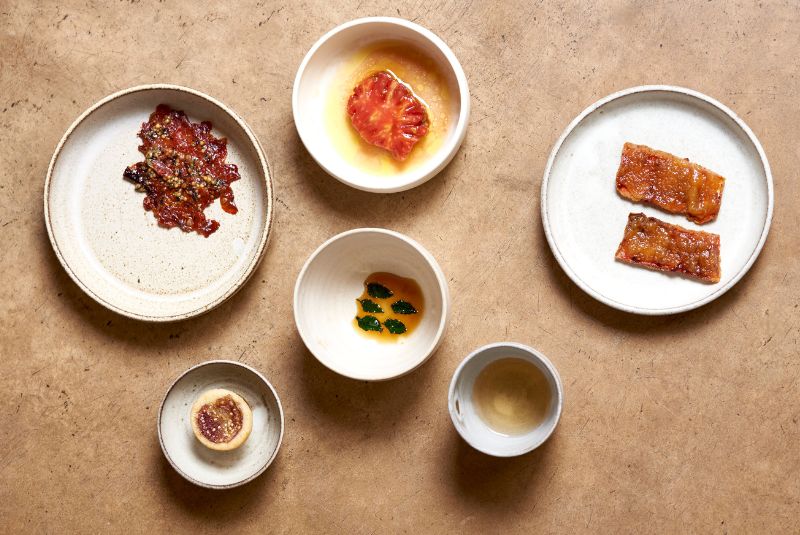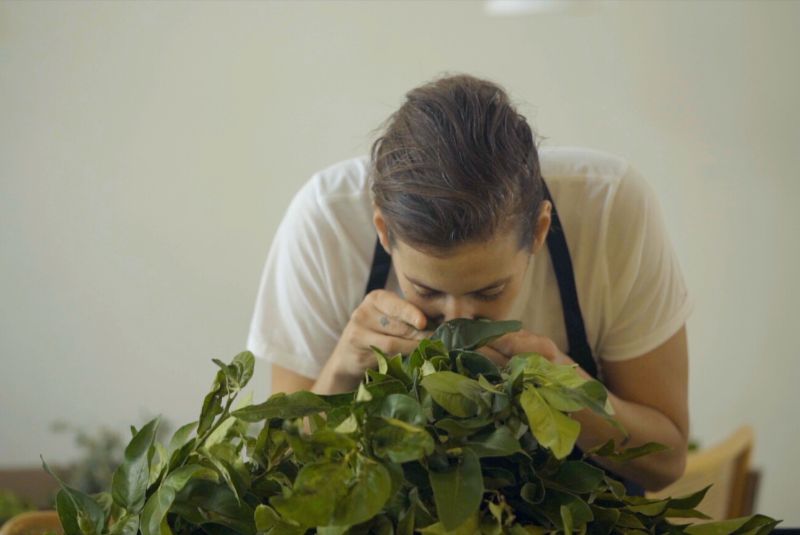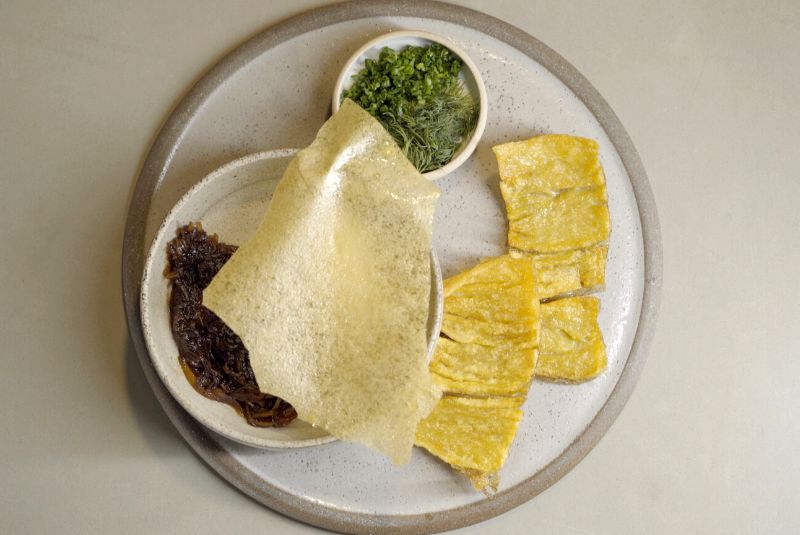Opa in Tel Aviv has just been named the winner of the One To Watch Award as part of Middle East & North Africa’s 50 Best Restaurants 2023, sponsored by S.Pellegrino & Acqua Panna. 50 Best speaks to Chef Shirel Berger about funky rooftop mushrooms, lessons from her grandfather and why you shouldn’t describe her restaurant as ‘vegan’
Walk a few paces down a secluded side street off Tel Aviv’s colourful Levinsky spice market and you’ll find chef-owner Shirel Berger’s restaurant, Opa. The bustle of the cosmopolitan city falls away as you enter the dining room – a converted warehouse flooded with sunlight and bedecked with softwood furnishing and low-hanging lamps. The décor may be muted, but every dish packs a flavourful punch.
Berger’s vibrant, plant-based cuisine, which burst onto Tel Aviv’s diverse restaurant scene in 2018, earns Opa this year’s One To Watch Award as part of Middle East & North Africa’s 50 Best Restaurants.
“I do love that dissonance between the market, our street and Opa. It drives me nuts and I love it. You walk off one of the ugliest streets into this very clean and minimalist world,” begins Berger with a grin. “I didn’t want anything to take away from the experience of the food.”
The exterior of Opa, found in Tel Aviv's Levinsky spice market
The 10-course tasting menu undoubtedly takes centre stage. Exploring Israel’s vast array of plant life, each of Opa’s dishes heroes a different fruit or vegetable.
“Seven years ago, when I started on this journey, cooking with only vegetables was something that no one had thoroughly explored,” reflects Berger. “Now, restaurants like Noma have whole vegetable seasons, and many more are making fruit the stars of the meal, while the fish and meat are served as sides; it just makes sense to me. We’re in the 21st century now and to me, this is how chefs should cook.”
While the scope of ingredients restricts itself to things grown and cultivated, Berger’s team thrives on the challenge: “I’m totally fascinated by the endlessness of the plant kingdom. As a cook you’re always into discovering new flavours and textures – and cooking with only fruit and vegetables has made me push the limits of my own creativity.”
The menu changes according to the bounty of each season, but some of the most creative dishes reappear due to popular demand. On any given day, diners can expect the likes of Jerusalem artichoke in macadamia milk, strawberry and asparagus soup and delicate oyster mushrooms.
Opa's 10-course menu explores Israel's plant kingdom
The dichotomous flavours are not the only things that stand out on Opa’s table. By using unusual stalks and offcuts from her produce, such as the leaves from a tomato plant and preserved melon rind – all of which are grown by local and small-scale farmers – the forward-thinking chef encourages her diners to re-examine the meaning of sustainable dining.
“This is why I don't say that Opa is a vegan restaurant,” she says. “You can be vegan and still import products that are being overused and abused, like coconut milk. Once you go local to what's growing within your country, you’re really helping the environment by reducing food miles, waste and pollution.”
Opa’s food is a true love letter to Israel’s biodiversity and terroir. Inspiration for new dishes can bloom out of anything from Berger’s discovery of a new species of toadstool – “mushrooms in the north have a completely different flavour to the ones in the south” – to her time spent foraging in nearby woodland.
Since opening in 2018, the team has exercised great creativity in its search for new flora and, during the pandemic, found a source even closer to home: the restaurant’s rooftop was transformed into an urban garden.
The rooftop garden features organic vegetables, fruits, and wild herbs
“During Covid, we were completely closed for three weeks,” Berger remembers. “We were growing a vast amount of vegetables and had so much fresh produce, but no one to feed.”
The surplus drove the creation of Opa’s ‘pantry’. The team began to preserve, pickle and ferment excess fruits and vegetables, then experimenting with the newfound flavours. Armed with a completely unique palette of ingredients, Berger has instilled this practice into the creation of the current menus.
“Now when we work on a new dish, we use a lot of by-products from the season before. Right now, we have a radish course that’s served with fermented lychee,” she explains.
Nevertheless, being primarily plant-based and sustainable is not without its complications. “When you own a restaurant, you can have all of these romantic philosophies of how you're going work with organic farmers, but then there’s the reality of having to pay bills and support your team.”
Seasonality itself can be a limiting factor: “Even if it is cauliflower season, when you’re working with independent producers, their cauliflowers might not be ready for three weeks. And I can be as creative as I like, but at the same time, sweetie pie, you can’t serve tomatoes in the middle of January...!” she says with a laugh. 
One of Opa's popular dishes: black kholrabi with its leaves and elsar truffles
Future flavour
Ambitious but reflective, Opa’s chef is always looking for ways to improve the restaurant’s cuisine. “Ideally, I would want to produce our own sugar, or use Israeli flour, but unfortunately we can’t at the moment, so we do what we can to source it locally, or at least organically.”
For Berger, this drive for improvement was coupled with innate passion for cooking from an early age. Growing up in a family with a restaurant industry background, she remembers feeling completely at home in the kitchen, learning to cook new dishes with her grandfather. “So many of my childhood memories are about food. My grandfather’s restaurant was a hamburger joint – that’s why I called the restaurant ‘Opa’, because he inspired me so much.”
The family legacy continues at Opa as Berger works closely with her twin sister, Sharona. While Shirel focusses on the culinary development, Sharona takes the lead with the front-of-house management.
“Sharona and I have had this vision for a very long time,” says Berger proudly. “It obviously helps to have someone by your side who loves you unconditionally. I’m probably the ‘mad artist’ out of the pair of us, and she’s very level-headed, but I think everyone in this industry has to have a slight nuttiness to them.”
Looking into the future, bolstered by the One To Watch Award 2023, Berger reveals big plans for the restaurant: “Looking back at how our concept has grown, I think we’ve become so original in the way that we cook and think about food – and I want to keep advancing.
“I want to be one of the best restaurants in the world, for sure. We have a way to go, but I believe in myself, and mostly, I believe in Opa.”
Now watch the video to learn more about Opa:
The upcoming edition of Middle East & North Africa's 50 Best Restaurants, sponsored by S.Pellegrino & Acqua Panna, will be announced on Monday, 30th January 2023 in Abu Dhabi. To be the first to hear about the latest news and announcements, browse the website, follow us on Instagram, find us on Facebook, visit us on Twitter and subscribe to our YouTube channel.

